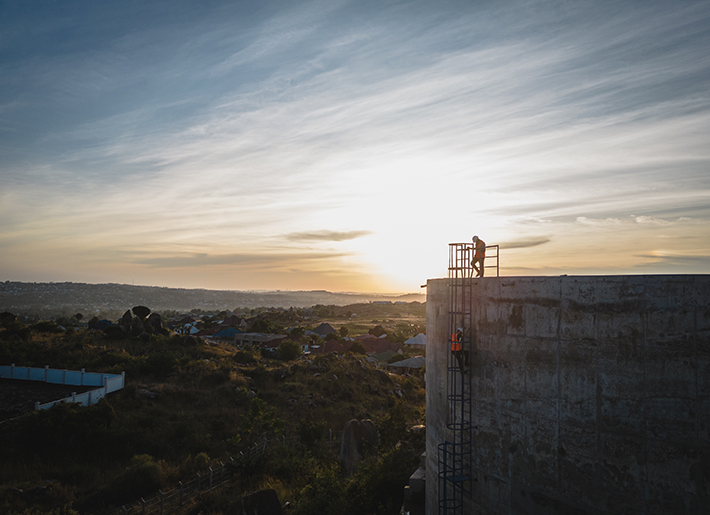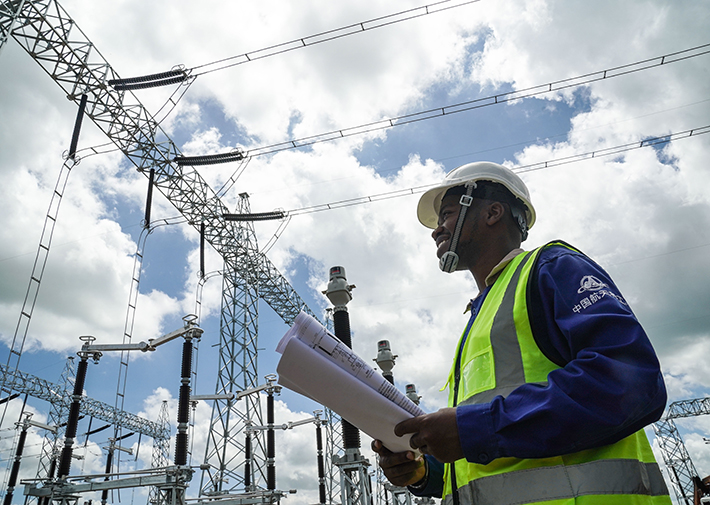|
||||||||||
| Home Nation World Business Opinion Lifestyle ChinAfrica Multimedia Columnists Documents Special Reports |
|
||||||||||
| Home Nation World Business Opinion Lifestyle ChinAfrica Multimedia Columnists Documents Special Reports |
| ChinAfrica |
| Countering Headwinds |
| China and Africa need to make further efforts to sustain cooperation amidst a challenging global environment |
| By Daryl Swanepoel | VOL. 15 September 2023 ·2023-09-08 |

Workers of China Civil Engineering Construction Corp. inspect a reservoir in Buswelu of Mwanza Region, Tanzania, on 12 June
COVID-19 pandemic and the Russia-Ukraine conflict have changed the world in two major respects: Global supply chains have been disrupted, and a multipolar world has started to reemerge. China and Africa are not immune to these trends.
The COVID-19 pandemic has materially impacted the world economy, including China and African countries. The lockdown measures to combat the pandemic further hindered countries to meet their economic goals. China is also feeling the pressure from the global cost of living crisis resulting from the Russia-Ukraine conflict, sanctions on Russia, and a more inward-looking US.
In Africa, the conflict has raised food and fuel prices, disrupted trade in goods and services, tightened the fiscal space, constrained green transitions, and reduced the flow of development finance within the continent, resulting in unprecedented levels of inflation and food scarcity. Africa lost the GDP growth it would have had if COVID-19 were not there.
In this changed environment, the mutually beneficial cooperative nature of the China-Africa development model must not become a casualty of the emerging global politics. African countries will come under increasing pressure to choose sides. They must not.
Benefits of cooperation
China-Africa cooperation has contributed immensely to the economic and social development of Africa. In fact, China is Africa’s largest trading partner and source of foreign direct investment, which has significantly contributed to the continent’s infrastructure development and economic growth. China has offered development loans to nations, such as Angola, invested in agriculture, and assisted in the development of special trade and other economic zones in several states.
China’s “going global” policy has resulted in it diversifying its business in Africa. It has invested across a wide spectrum of industries ranging from green energy development to telecommunications and agriculture. And it has, through a mixture of public and private funds, financed the construction of roads, railways, ports, airports, hospitals, schools and stadiums, and has provided humanitarian aid.
China is also increasingly helping Africa to establish a more secure, conflict-free continent. At the opening ceremony of the Eighth Ministerial Conference of the Forum on China-Africa Cooperation (FOCAC) in November 2021, Chinese President Xi Jinping said that peace and security play an important role and that China will undertake 10 peace and security projects for Africa.

A local worker is pictured at the Konza transformer substation being built by a Chinese company in Machakos County, Kenya, on 5 May
Strengthening multilateralism
FOCAC is viewed with a measure of scepticism by some of those outside of the arrangement. But FOCAC should not be swayed by such criticism. Rather, it should strengthen its resolve for multilateralism. In this regard, it can consider two things.
Firstly, FOCAC should establish an inclusive strategic think tank within its structures to contemplate the changing diplomatic environment, and to mitigate the new economic challenges that are bound to arise from the actions of more inward-looking powers. And the work of FOCAC needs to be aligned with the Global Development Initiative (GDI) and Global Security Initiative (GSI).
The think tank needs to be properly resourced and organised to enable it to adequately prepare research and analyses to underpin the policymakers within FOCAC. To this end, a proper inclusive coordination mechanism – balanced with Chinese and African input – needs to be designed that will ensure adequate research outcomes across all the strategic focus areas of the initiatives on an ongoing and sustainable basis.
This will require working teams aligned with the GDI and GSI objectives. And since the priority areas of the initiatives are closely aligned with many of the 17 Sustainable Development Goals (SDGs) of the United Nations, including in the areas of poverty eradication, food security, health, climate action, the planet, industrialisation, innovation and means of implementation, the working teams’ programmes ought to be synchronised with the SDGs. The China-Africa Think Tanks Forum could seamlessly be morphed into such a structure, tasked to undertake such work.
Secondly, Africa should advance an argument in favour of triangular engagement among itself, China and the West. A sound relationship with China, and a sound relationship with the West are what is in the best interest of Africa. Therefore, creating a mechanism for the three parties to engage in development and security issues in Africa could be a useful tool to guide and assist continental leaders in harnessing the most out of their diplomatic and inter-governmental efforts.
That said, the more rational thinkers do see the need for an improved relationship between China and the US. For instance, US Treasury Secretary Janet Yellen recently said that the US and China “can and need to find a way to live together” despite the strained relations.
Finding that way will require mechanisms of dialogue between the two sides, and as Africans ponder their relations between the two, the need for three-way engagement seems evident. It may be, given the current tensions, that direct triangulation may not immediately be possible, and that parallel dialogue might be more feasible. Whatever the mechanism, the need is urgent.
The initiation of the triangular discussion could take the form of a high-level roundtable between academics, geopolitical analysts and experts tasked with exploring options for convergence, cooperation and co-existence. The neutrality of the convening authority will, of course, be key.
*The article is an edited extract from the Inclusive Society Institute’s paper titled “Navigating China-Africa Cooperation Within a Globally Constrained Geopolitical Environment,” which was prepared for the 12th Meeting of the China-Africa Think Thanks Forum held on 30-31 May in Jinhua, Zhejiang Province, China.
| About Us | Contact Us | Advertise with Us | Subscribe |
| Copyright Beijing Review All rights reserved 京ICP备08005356号-5 京公网安备110102005860号 |